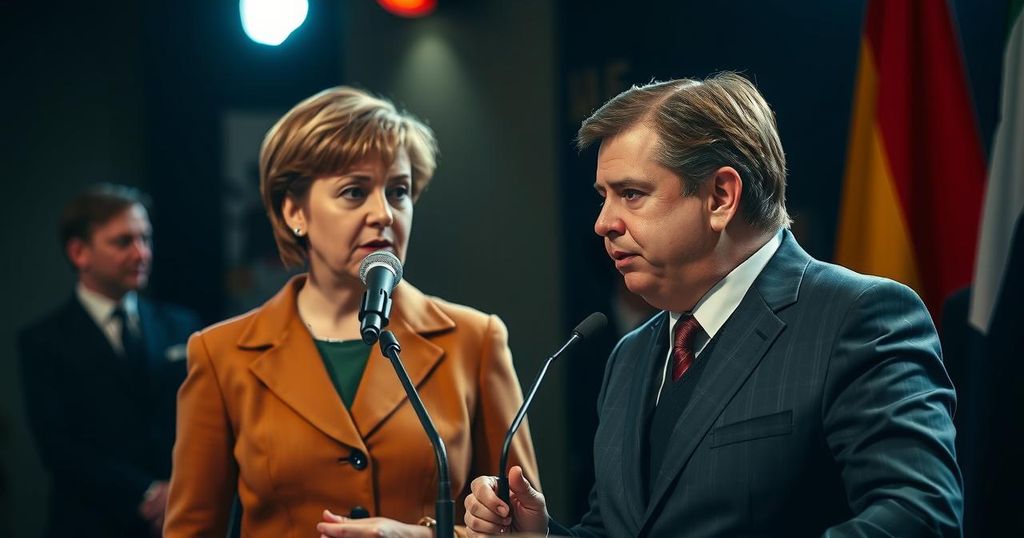Pressure Mounts on Scholz to Step Aside for Pistorius Ahead of Election

Chancellor Olaf Scholz faces increasing calls to concede his candidacy for the February election to Defence Minister Boris Pistorius amid plummeting popularity. The SPD is set for crisis talks as Scholz’s leadership dwindles against the backdrop of economic challenges and rising opposition support. Polls show the CDU far outpacing the SPD, fueling discontent within party ranks.
Chancellor Olaf Scholz of Germany is experiencing significant pressure to resign as his party’s candidate for the upcoming snap election scheduled for February 23, in favor of the more popular Defence Minister, Boris Pistorius. The Social Democratic Party (SPD) plans to hold emergency discussions regarding its chancellor candidate while Scholz returns from the G20 summit in Brazil. With predictions of a shift in candidacy amid dwindling support for Scholz, discussions mirror Vice President Kamala Harris’s ascension in the US elections following Joe Biden’s decision to step back. Scholz has led a coalition government since 2021; however, internal conflicts have escalated to the point of a recent collapsed alliance, exacerbated by the dismissal of pro-business finance minister Christian Lindner. Polls indicate Scholz’s declining popularity, dropping to last place among Germany’s political leaders, as Boris Pistorius consistently outperforms him. Prominent figures within the SPD are increasingly vocal about the need for a candidate capable of securing electoral victory over the Christian Democrats and their affluent candidate Friedrich Merz. Amid rising dissatisfaction within the SPD base, former party leader Sigmar Gabriel has publicly urged for decisive leadership to avoid severe losses in the election. Current polls reveal the CDU far ahead at 32% approval, while the SPD languishes at 16%. This environment reflects broader anti-incumbent sentiments in Western democracies, driven by economic grievances such as inflation and social inequality stemming from geopolitical tensions, particularly due to Russia’s actions in Ukraine. Critics attribute the SPD’s troubles to Scholz, noting his perceived aloofness and lack of connection with both voters and fellow political leaders. Despite gaps in support for his leadership, Scholz may retain some leverage due to internal discord regarding Ukraine policy. Although he has been the primary figure for German military assistance to Ukraine, he maintains a more cautious stance than the assertive Pistorius, who advocates a more aggressive military support policy.
The current political climate in Germany is heavily influenced by the impending snap election, amidst rising dissatisfaction with Olaf Scholz’s leadership. His coalition, which began in 2021, has been fraught with internal disputes, leading to diminishing public support as the economic landscape faces challenges like inflation and a struggling automotive industry. Boris Pistorius has emerged as a virtuous alternative for voters, refining the SPD’s image against a well-groomed and wealthy opponent from the CDU. The dynamics at play present a unique set of challenges for the SPD as they strive for electoral success in a rapidly changing political environment.
In conclusion, Chancellor Olaf Scholz is under mounting pressure to relinquish his candidacy for the upcoming election, as Boris Pistorius gains favor with voters and party officials alike. With critical discussions planned within the SPD and polls indicating a significant dip in support for Scholz, the party must make crucial decisions to enhance their prospects against the resurgent CDU. Economic struggles and public sentiment reveal profound challenges that any prospective leader must navigate to secure electoral success.
Original Source: www.theguardian.com








